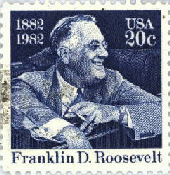Other New Deal Programs
New Deal efforts were carried on, generally, against vehement criticism, not only from the Republican Party but often from within the Democratic Party itself. Nevertheless, in the 1936 election, Roosevelt won an even more decisive victory over his Republican opponent (this time Governor Alfred E. Landon of Kansas) than in 1932.
 From 1932 to 1938 there was widespread public debate on
the meaning of New Deal policies to the nation's political and
economic life. It became obvious that the American conception
of government was changing, that greater governmental
responsibility for the people's welfare was winning increasing acceptance.
Some New Deal critics argued that the indefinite extension of
governmental functions would end in undermining all the liberties
of the people. President Roosevelt insisted that measures fostering
economic well-being would strengthen liberty and democracy.
From 1932 to 1938 there was widespread public debate on
the meaning of New Deal policies to the nation's political and
economic life. It became obvious that the American conception
of government was changing, that greater governmental
responsibility for the people's welfare was winning increasing acceptance.
Some New Deal critics argued that the indefinite extension of
governmental functions would end in undermining all the liberties
of the people. President Roosevelt insisted that measures fostering
economic well-being would strengthen liberty and democracy.
In a radio address in 1938, Roosevelt reminded the American people:
Democracy has disappeared in several other great nations, not because the people of those nations disliked democracy, but because they had grown tired of unemployment and insecurity, of seeing their children hungry while they sat helpless in the face of government confusion and government weakness through lack of leadership in government. Finally, in desperation, they chose to sacrifice liberty in the hope of getting something to eat. We in America know that our democratic institutions can be preserved and made to work. But in order to preserve them we need.. . to prove that the practical operation of democratic government is equal to the task of protecting the security of the people.... The people of America are in agreement in defending their liberties at any cost, and the first line of the defense lies in the protection of economic security.
Before Roosevelt's second term was well under way, his domestic program was overshadowed by a new danger--little noted by the average American--posed by the expansionist designs of totalitarian regimes in Japan, Italy, and Germany. Early in the 1930s, the first of these nations struck. In 1931, Japan invaded Manchuria and crushed Chinese resistance; a year later she set up the puppet state of Manchukuo. Italy, having succumbed to Fascism, enlarged her boundaries in Libya and in 1935-36 reduced Ethiopia to subjection. Germany, where Adolf Hitler had organized his National Socialist Party and seized the reins of government, reoccupied the Rhineland and undertook large-scale rearmament.
